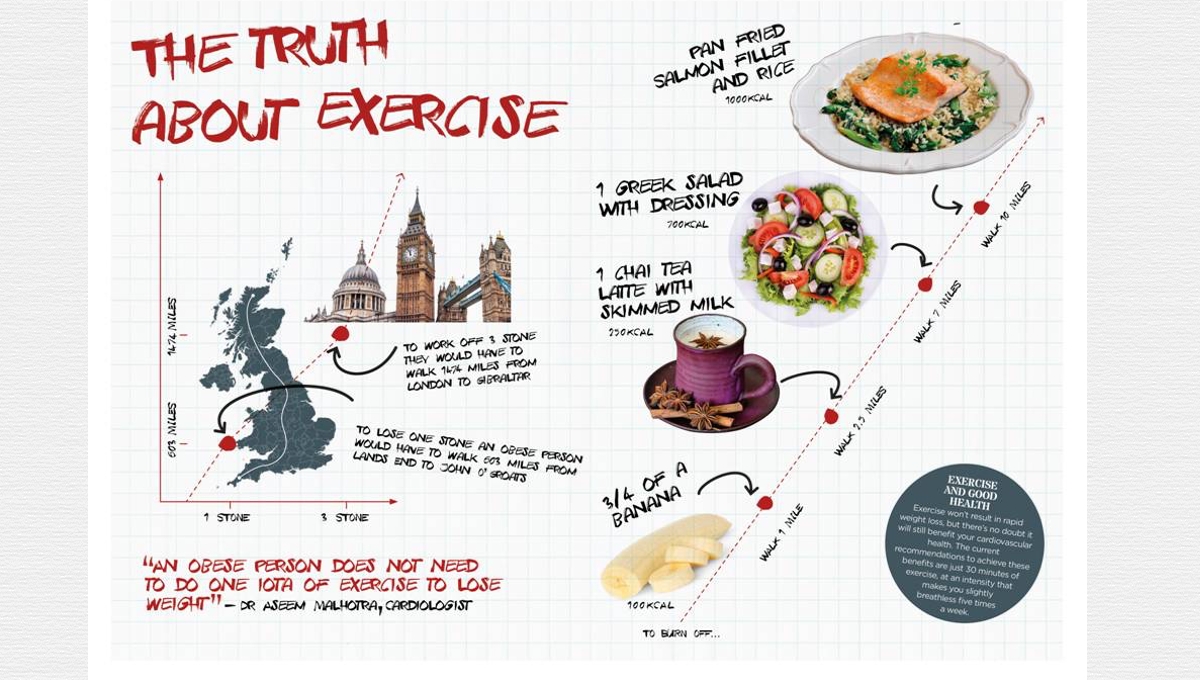“You cannot outrun a bad diet.” These are the words of Dr Aseem Malhotra, a cardiologist and science director of campaign group Action on Sugar.
Dr Malhotra feels that fat people are being let down by advice that exercise is the key to weight loss. For the truth is, while exercise has many health benefits, such as reducing the risk of heart disease, diabetes, lower back pain, dementia and other conditions, it remains an ineffective diet method for pretty much everyone.
While evidence shows exercise can improve mood, increase concentration and reduce anxiety, weight loss is an entirely different game. To actually lose weight via exercise, you first need to be aware that it takes a sustained and much-disciplined effort. And all that effort can be cancelled out by a quick snack on the way home.
An obese person does not need to do one iota of exercise to lose weight.
Dr Malhotra
“My biggest concern,” adds Dr Malhotra in an editorial for the British Medical Journal, “is that the messaging coming to the public suggests you can eat what you like, as long as you exercise. That is unscientific and wrong.”
Furthermore, a study on obese adults, conducted in the late 1990s by Professor Paul Gately at Leeds Metropolitan University, found the participants’ fitness levels to be very low (44% below average) – and at these levels, even just walking was a major challenge.
The study highlighted that while in theory exercise can lead to weight loss, the reality for most obese people is that they can’t exercise enough to make an impact.
How many calories do you need each day?
Metabolism refers to the thousands of chemical reactions continuously taking place in your body, and all this activity is powered by recently eaten food or by your fat stores.
Basal metabolic rate (BMR) is the energy you would need if you were lying in bed all day. Your BMR powers essential bodily functions, such as breathing and keeping warm, and it burns 60-70% of the calories you use every day. It does not relate to exercise.
You’ll sometimes see it referred to as RMR (resting metabolic rate) and, although the two are calculated slightly differently, they tend to be used interchangeably.
The higher your weight, the higher your BMR, simply because a larger body needs more energy to keep its basic functions ticking over. Think of it in terms of cars – a Rolls Royce uses more petrol per mile than a Mini, because it’s heavier to move.
Your body composition also affects your BMR. Pound for pound, muscle uses around seven times more energy than fat, so the more muscle you have compared to fat, the faster your metabolic rate will be. This explains why, on average, men have a higher BMR than women.
Physical activity accounts for the remaining 30-40% of the calories you use each day, so the more you move, the more energy you burn. Movement includes everything from walking, cycling and jogging to simply standing up.
So what is the best weight loss solution? Join our #makeachange debate on Twitter or read how Sarah used CBT to combat her eating problems.



